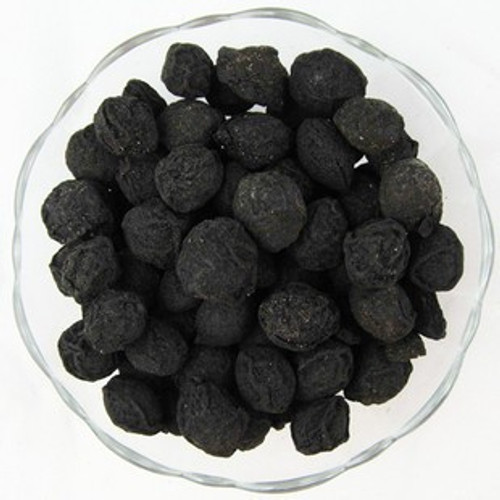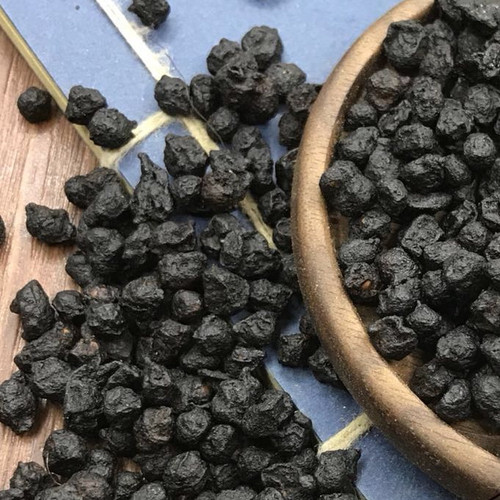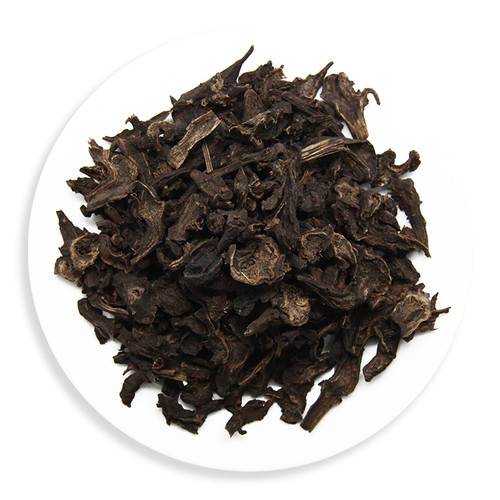Product Overview
Parts used: Dried prepared root
TCM category: Tonic herbs for Blood Deficiency
TCM nature: Warm
TCM taste(s): Bitter Sweet
Meridian affinity: Heart Kidney Liver
Scientific name: Polygonum multiflorum
Other names: Ho Shou Wu, Fo Ti Tieng, Fallopia multiflora or Chinese knotweed
Use of fleeceflower roots (He Shou Wu) in TCM
Please note that you should never self-prescribe TCM ingredients. A TCM ingredient is almost never eaten on its own but as part of a formula containing several ingredients that act together. Please consult a professional TCM practitionner, they will be best able to guide you.
Preparation: Extract the root, soak in water and remove impurities. Slice and dry in the shade. Steam and dry 9 times.
Dosage: 9-30 grams
Main actions according to TCM*: Nourishes the Liver, Kidneys and Essence. Tonifies the Blood. Moistens the Intestines. The raw form of this herb is used for Fire and toxicity.
Primary conditions or symptoms for which fleeceflower roots may be prescribed by TCM doctors*: Anemia Tinnitus Premature graying Knee pain Abnormal uterine bleeding Leukorrhalgia Malaria Hyperlipidemia Back pain Impaired vision Constipation Boils Abcesses Goiter Scrofula
Contraindications*: This herb should not be used by those with diarrhea or when there are Phlegm conditions associated with Spleen Deficiency.
Common TCM formulas in which fleeceflower roots are used*:
For premature aging and gray hair combine fleeceflower roots with glossy privet fruits (Nu Zhen Zi), goji berries (Gou Qi Zi) and ginseng (Ren Shen).
For constipation caused by Dryness of the Intestines combine fleeceflower roots with mulberry fruits (Sang Shen), black sesame seeds (Hei Zhi M?) and hemp seeds (Huo Ma Ren).
Key TCM concepts behind fleeceflower roots (He Shou Wu)'s properties
In Traditional Chinese Medicine (TCM), fleeceflower roots are plants that belong to the 'Tonic herbs for Blood Deficiency' category. Tonic herbs are used for patterns of Deficiency, when one lacks one of the 'Four Treasures' (Qi, Blood, Yin and Yang). Blood tonics tend to be bitter-sweet with either a Warm or neutral nature. Because the Liver stores Blood, all Blood tonics enter that Organ meridian.
As suggested by its category fleeceflower roots are plants that are Warm in nature. This means that fleeceflower roots tend to help people who have too much "cold" in their body, although with less effect than a plant that would be Hot in nature. Balance between Yin and Yang is a key health concept in TCM. Those who have too much cold in their body are said to either have a Yin excess (because Yin is Cold in nature) or a Yang deficiency (Yang is Hot in Nature). Depending on your condition fleeceflower roots can help restore a harmonious balance between Yin and Yang.
Fleeceflower roots also taste Bitter and Sweet. The so-called "five elements" theory in Chinese Medicine states that the taste of TCM ingredients is a key determinant of their action in the body. Bitter ingredients like fleeceflower roots tend to have a cleansing action on the body by clearing heat, drying dampness and promoting elimination via urination or bowel movements. On the other hand Sweet ingredients tend to slow down acute reactions and detoxify the body. They also have a tonic effect because they replenish Qi and Blood.
The tastes of ingredients in TCM also determine what organs and meridians they target. As such fleeceflower roots are thought to target the Heart, the Kidney and the Liver. In addition to regulating blood flow, in TCM the Heart is believed to be the store of the "spirit" which basically refers to someone's vitality. The Kidneys do not only regulate the urinary system but also play a key role in the reproductive system and the growth and aging process of the body. The Liver is often referred as the body's "general" because it is in charge of regulating the movements of Qi and body fluids. It also takes a leading role in balancing our emotions.
Use of fleeceflower roots (He Shou Wu) as food
Fleeceflower roots are also eaten as food. It is used as an ingredient in dishes such as He shou wu soup with pork and black beans.










